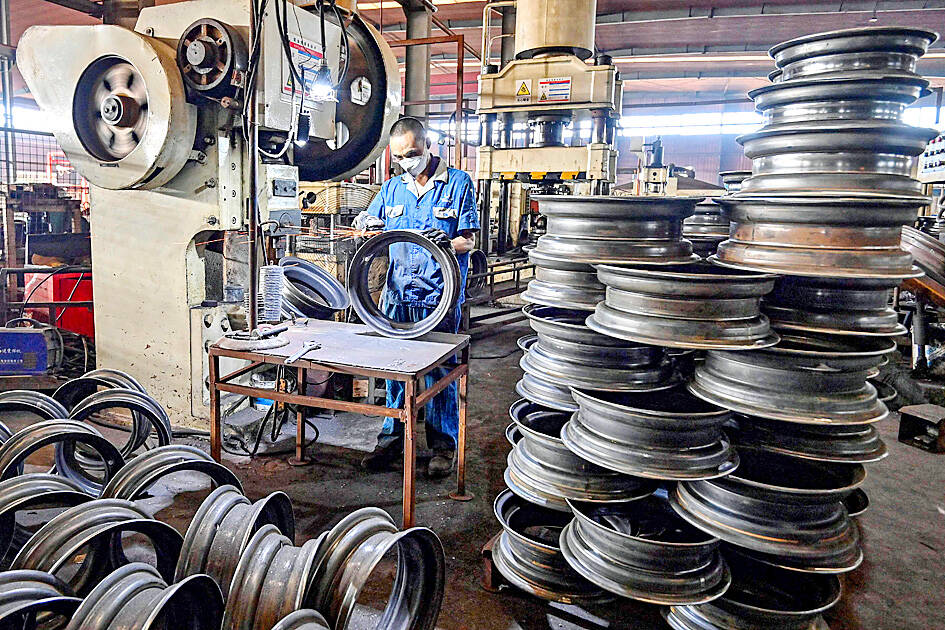Profits at China’s industrial firms fell at the sharpest pace since April last year, dragged down by weaker manufacturing as part of an economic slowdown that is now prompting extraordinary stimulus efforts.
Industrial profits at large Chinese companies decreased 17.8 percent on an annual basis last month, after a 4.1 percent gain in July, the Chinese National Bureau of Statistics (NBS) said in a statement yesterday.
Earnings growth grew 0.5 percent to 4.65 trillion yuan (US$663 billion) in the first eight months compared with the same period last year.

Photo:AFP
Bloomberg Economics had forecast a deceleration to 3.6 percent last month, but expected growth to stay steady in the January-to-August period relative to the first seven months of the year. The figures are a key gauge of measuring the financial health of factories, mines and utilities that can affect their investment decisions in the months to come.
The NBS blamed last month’s slowdown — the first drop in five months — on a lack of market demand, the effect of high temperature and floods in some areas, as well as a high base of comparison.
“Domestic consumer demand is still weak, the external environment is complex and changeable, and the foundation for the recovery of industrial profit still needs to continue to consolidate,” NBS statistician Yu Weining (于衛寧) said in a statement accompanying the release.
The latest reading came against the backdrop of a slower-than-expected increase in industrial output last month, when it extended a weakening streak to the longest in almost three years.
The slowdown became more apparent during a weak earnings season that showed little sign of any imminent recovery in consumption.
Thinner profit margins reflect the frailty of the broader Chinese economy in the absence of stronger domestic demand. Underscoring the drag on earnings, producer prices have been falling since late 2022, intensifying fears that deflation was becoming entrenched in China.
With signs mounting that the world’s second-largest economy risked missing Beijing’s goal of growing about 5 percent, the government pivoted this week and unveiled a broad package of stimulus measures to revive growth.
The country’s top leadership also used its monthly huddle to call for stronger fiscal support and other steps that signaled a growing urgency to arrest the slowdown.

South Korea’s equity benchmark yesterday crossed a new milestone just a month after surpassing the once-unthinkable 5,000 mark as surging global memory demand powers the country’s biggest chipmakers. The KOSPI advanced as much as 2.6 percent to a record 6,123, with Samsung Electronics Co and SK Hynix Inc each gaining more than 2 percent. With the benchmark now up 45 percent this year, South Korea’s stock market capitalization has also moved past France’s, following last month’s overtaking of Germany’s. Long overlooked by foreign funds, despite being undervalued, South Korean stocks have now emerged as clear winners in the global market. The so-called “artificial intelligence

NEW IDENTITY: Known for its software, India has expanded into hardware, with its semiconductor industry growing from US$38bn in 2023 to US$45bn to US$50bn India on Saturday inaugurated its first semiconductor assembly and test facility, a milestone in the government’s push to reduce dependence on foreign chipmakers and stake a claim in a sector dominated by China. Indian Prime Minister Narendra Modi opened US firm Micron Technology Inc’s semiconductor assembly, test and packaging unit in his home state of Gujarat, hailing the “dawn of a new era” for India’s technology ambitions. “When young Indians look back in the future, they will see this decade as the turning point in our tech future,” Modi told the event, which was broadcast on his YouTube channel. The plant would convert

‘SEISMIC SHIFT’: The researcher forecast there would be about 1.1 billion mobile shipments this year, down from 1.26 billion the prior year and erasing years of gains The global smartphone market is expected to contract 12.9 percent this year due to the unprecedented memorychip shortage, marking “a crisis like no other,” researcher International Data Corp (IDC) said. The new forecast, a dramatic revision down from earlier estimates, gives the latest accounting of the ongoing memory crunch that is affecting every corner of the electronics industry. The demand for advanced memory to power artificial intelligence (AI) tasks has drained global supply until well into next year and jeopardizes the business model of many smartphone makers. IDC forecast about 1.1 billion mobile shipments this year, down from 1.26 billion the prior

People stand in a Pokemon store in Tokyo on Thursday. One of the world highest-grossing franchises is celebrated its 30th anniversary yesterday.